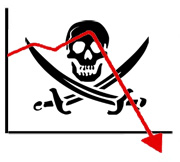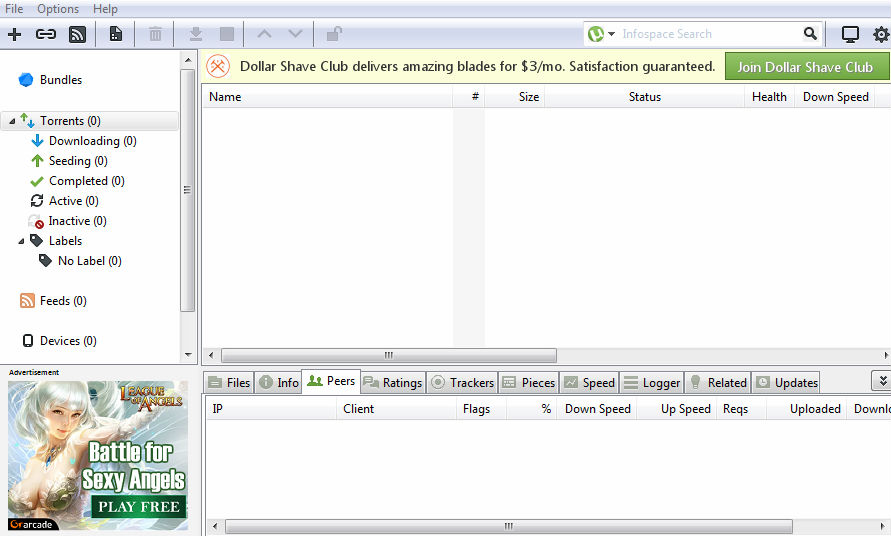MPAA Strikes Anti-Piracy Deal With Torrent Client Creator
mercredi 4 juin 2014 à 16:00 While BitTorrent Inc.’s uTorrent and Mainline products grab most of the headlines, neither are the world’s most popular torrent client. That honor falls to the Chinese-operated Xunlei or ‘Thunder’ software.
While BitTorrent Inc.’s uTorrent and Mainline products grab most of the headlines, neither are the world’s most popular torrent client. That honor falls to the Chinese-operated Xunlei or ‘Thunder’ software.
As far back as 2009 the world’s leading BitTorrent trackers reported that Xunlei users accounted for more than 104 million unique users. Currently the client has an estimated 142 million users.
Considering the software’s reach the news today that client owner Shenzhen Xunlei Networking Technologies has done an anti-piracy deal with the MPAA is received with some interest, not least since Xunlei is the 12th largest Internet company in China.
The anti-piracy agreement
The Content Protection Agreement (CPA) will see Shenzhen Xunlei actively protect MPAA content including movies and TV shows. Among other measures, the landmark deal will see Xunlei implement a video recognition system to ensure that all MPAA content being made available via Xunlei is properly licensed.
The Chinese company, which is in part backed by Google, has also agreed to educate its users on the effects of online piracy and where to obtain officially licensed copies of MPAA works.
Xunlei operates a number of online ventures, including a streaming service with 136 million monthly users, so it seems logical that the deal will encompass its entire portfolio. Clearly an agreement without ‘teeth’ across all products wouldn’t be good for either Xunlei or the MPAA. The big question now, however, is what pushed the companies together. The answer, as always, is money.
MPAA hindered Xunlei’s IPO
Early 2011 Xunlei announced plans to go public with a listing on NASDAQ, the largest U.S stock market. But by November the whole thing had been canceled, with a poor economic climate held to blame. However, in the background the issue of copyright infringement was burning away.
According to reports in Chinese media, in April 2013 the MPAA demanded that Xunlei install a software plug-in to block its copyrighted content from appearing online. However, Xunlei was only prepared to install it into a video player, not their other software. Talks collapsed, legal action loomed, and the IPO dream was shattered. Clearly the company would need to regroup and consider its options.
Improving its image for a second run
In March 2014 Xunlei hosted the Chinese Internet Copyright Protection Action Plan conference. A former employee of the company who spoke on condition of anonymity said Xunlei did this to improve its image and put its infringement issues behind it.
“You must make a clean break with the pirates,” he told local media.
Just under two weeks ago came the clearest signs yet that Xunlei was ready to move towards that goal.
On May 23rd Xunlei Ltd filed a registration with the U.S. Securities and Exchange Commission for an IPO of its U.S. dollar shares. The offering price was proposed at a maximum of $100 million under the symbol ‘XNET’.
But while doing a deal with the MPAA might stop Hollywood hindering Xunlei’s IPO again, the company’s filing makes worrying reading for potential investors.
Risky business
“Even if we comply with all of our obligations under the content protection agreement, the implementation of content protection measures may affect our users’ experience or otherwise make our services and products less competitive than those of our competitors, which could in turn materially and adversely affect our business, financial condition and results of operations,” the company writes.
“In the event that the content protection agreement is terminated or we are otherwise deemed not to be fully compliant with its material terms, the content providers may initiate a lawsuit or other proceeding against us, including for any past claims that they might otherwise have made prior to entering into the agreement. In addition, other third party content providers may still initiate lawsuits or other proceedings against us.”
A lack of compliance with the most basic of U.S. copyright protections raises yet another red flag.
“We do not currently satisfy all of the statutory requirements of any DMCA safe harbor. If we are ever held to be subject to United States copyright law, that could increase our risk of direct or indirect copyright liability for our resource discovery, acceleration or other services,” Xunlei explains.
Despite the concerns, others are prepared to put up big money. Last month Chinese smartphone manufacturer Xiaomi pumped $310 million into Xunlei boosting its share of the company to around 27%.
With a fresh tagline of “more than just downloads,” Xunlei will be hoping for an exciting future in the United States – without the MPAA on its back.
Source: TorrentFreak, for the latest info on copyright, file-sharing and anonymous VPN services.



 With roughly 150 million monthly users uTorrent has a massive user base. This means that when drastic changes are implemented, they are bound to disappoint quite a few people.
With roughly 150 million monthly users uTorrent has a massive user base. This means that when drastic changes are implemented, they are bound to disappoint quite a few people. 
